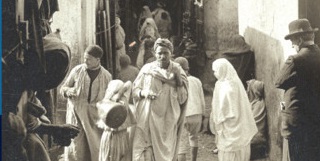
A generic narrative of decolonization has informed how we think about the history of empire. According to this narrative, a colonized people gradually becomes conscious of its predicament. Through this consciousness, it empowers itself eventually to throw off the colonizer. The imperial domain thus “decolonizes.” The central argument of French Colonialism from the Ancien Régime to the present is not so much that the decolonization narrative is wrong, but that it does not tell us everything we need to know about the history of empire. It leaves out “grey zones” that help explain both the durability of empire as a political form and why decolonization is a process rather than an event.
French colonialism from its origins to the present relied on cooperation. The book opens with a narrative from the captain of a slaving expedition in 1670. The captain arrived in Africa not as a conqueror, but as a salesman, almost a supplicant. The king received him according to a complex court etiquette worthy of a European sovereign. He had considerable experience dealing with European slave traders. The partners made a deal, and the captain departed with 433 captives, of whom some 100 died en route to Martinique. Through such contracting, the Atlantic slave trade would thrive into the nineteenth century.
Two centuries later, the grand colonial project of the Third Republic involved the “civilizing mission” or mission civilisatrice. France as a beacon of civilization had not just the right but the obligation to go forth and expand its empire, to raise up races coded as inferior. The mission blended selected republican principles with colonial capitalism. Republican imperialism certainly involved extraction, whether through raising colonial troops through nefarious arrangements with local intermediaries, conscript labor to build railroads, or alcohol and opium monopolies. But the Third Republic also built schools, and educated most of the anticolonial and postcolonial elites in the French empire. Some, such as Léopold Sédar Senghor of Senegal, worked strenuously against “decolonization,” at least at first, in favor of a multitiered Francophone federation. Others, such as Félix Houphouët-Boigny, preferred independence coupled with close economic, political, and military links to France. Still others, such as Vo Nguyen Giap, Ho Chi Minh, Ahmed Ben Bella and Franz Fanon, received a French education and at times worked for the colonial regime. The lessons taught through the mission civilisatrice proved not necessarily the lessons learned.
More than half a century after the legal end of the French empire, many traces remain. Millions of former colonial subjects moved to Europe, and their descendants have made France today no less multicultural than Britain or the United States. Parts of the empire simply became French national territory and remain such today. Myriad links between France and Africa remain. In Algeria and elsewhere, the postcolonial state came conspicuously to resemble the colonial state under different management. Paradoxically, the empire also lives on through struggles over how to evaluate and remember the empire as history.
French Colonialism from the Ancien Régime to the Present seeks more to explain the French colonial experience than to judge it. The moral issues of the grey zones are clear enough for readers to grapple with them on their own. It is a book that relies on active readers.

Latest Comments
Have your say!